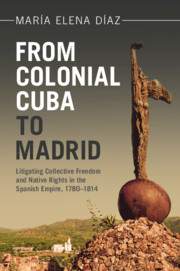 From Colonial Cuba to Madrid
From Colonial Cuba to Madrid Book contents
- From Colonial Cuba to Madrid
- Afro-Latin America
- From Colonial Cuba to Madrid
- Copyright page
- Contents
- Figures and Tables
- Acknowledgments
- Introduction
- 1 Imperial Reform, Privatization, and Enslavement
- 2 An Unorthodox Pueblo and Its Apoderados
- 3 Making the Case for Collective Freedom
- 4 Native Bonds, Native Rights
- 5 The Council’s Ruling and the Politics of Litigation
- 6 A “Pernicious” Communication
- 7 Violence, Marronage, and Litigation
- 8 The Final Outcome of the Case
- 9 The Nineteenth-Century Afterlife of the Freedom Edict of 1800
- Conclusion
- References
- Index
3 - Making the Case for Collective Freedom
Published online by Cambridge University Press: 14 November 2024
- From Colonial Cuba to Madrid
- Afro-Latin America
- From Colonial Cuba to Madrid
- Copyright page
- Contents
- Figures and Tables
- Acknowledgments
- Introduction
- 1 Imperial Reform, Privatization, and Enslavement
- 2 An Unorthodox Pueblo and Its Apoderados
- 3 Making the Case for Collective Freedom
- 4 Native Bonds, Native Rights
- 5 The Council’s Ruling and the Politics of Litigation
- 6 A “Pernicious” Communication
- 7 Violence, Marronage, and Litigation
- 8 The Final Outcome of the Case
- 9 The Nineteenth-Century Afterlife of the Freedom Edict of 1800
- Conclusion
- References
- Index
Summary
Based on discursive analysis, Chapter 3 focuses on the briefs produced in Madrid and the colony to mount the plaintiffs’ case for collective freedom. It examines the meanings of freedom in the Spanish Atlantic and the battery of legal tools, including the rarified one of prescription, deployed in the plaintiffs’ memorials to buttress their case of wrongful enslavement and collective freedom. The case entered unchartered terrain with the claim that belonging to a pueblo constituted a way of enacting and producing freedom collectively, an innovative claim based on notions of corporate belonging in the Spanish Atlantic world especially related to municipal bodies such as pueblos. The chapter parses a distinction between civil and political freedom made in some briefs. Civil freedom was understood in opposition to slavery as personal freedoms that free subjects could enjoy as royal vassals even in the context of colonialism and royal absolutism. Political freedom depended on municipal belonging, the space in which limited self-rule and citizenship could be locally enacted in an absolute monarchy. The chapter draws out the possible normative implications of this claim for Afro descendants at large who, at most, could only enjoy civil freedom rights in the empire.
Keywords
Information
- Type
- Chapter
- Information
- From Colonial Cuba to MadridLitigating Collective Freedom and Native Rights in the Spanish Empire, 1780–1814, pp. 105 - 146Publisher: Cambridge University PressPrint publication year: 2024